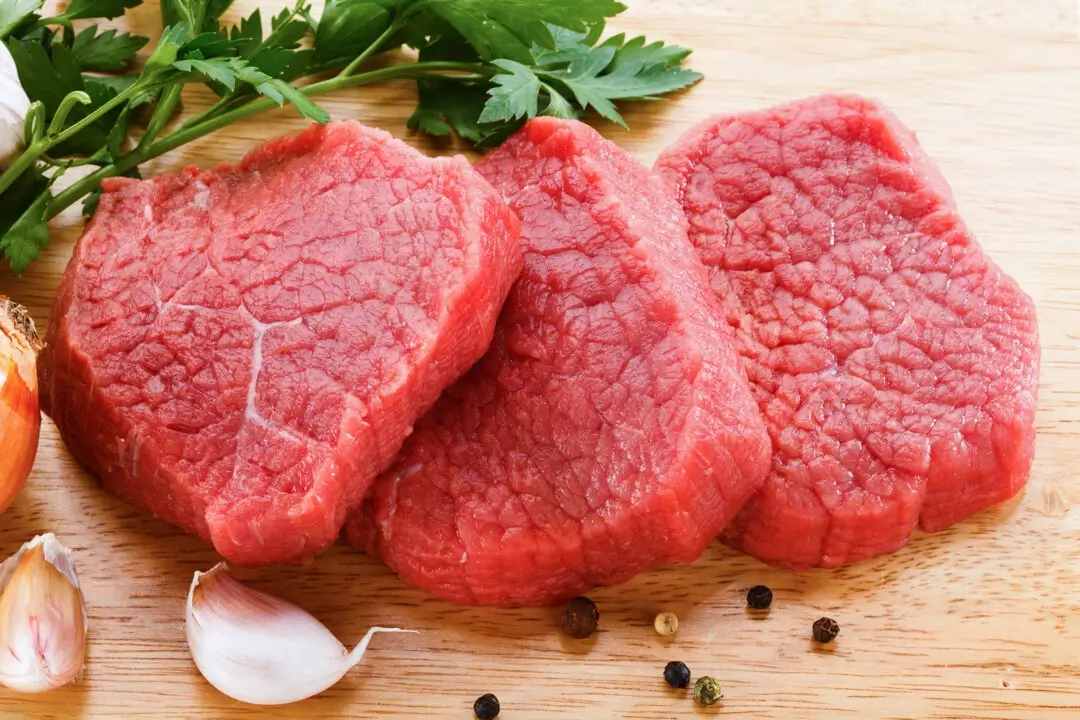
Your Protein Intake May Be The Bare Minimum
Muscle loss happens faster than you think—especially with age. Here’s why increasing your protein intake now can help protect your strength and longevity.
By: Zena le Roux | The Epoch Times
Eating enough protein is essential for preserving muscle. Yet experts say the recommended dietary allowance for protein does not reflect the amount required for optimal muscle health. This has important implications for healthy weight loss.
To thrive—not just survive—you may need much more.
Bare Minimum
“The recommended daily allowance (RDA) for protein is the minimum amount needed to prevent deficiency, not the optimal level for health,” registered dietician Angel Planells told The Epoch Times.
Dietary guidelines suggest that adults eat 0.8 grams of protein per kilogram of body weight per day.
However, protein requirements in the United States have not been reassessed since 2005. Some studies suggest that protein recommendations should exceed the RDA for certain adults, including seniors, active people, and those with chronic conditions such as obesity or Type 2 diabetes, Kristen Smith, a registered dietician nutritionist and spokesperson for the Academy of Nutrition and Dietetics, told The Epoch Times.
Research shows that consuming protein beyond the RDA can optimize health outcomes, particularly for older adults, by helping prevent muscle loss (sarcopenia), supporting muscle maintenance and weight management, and enhancing feelings of fullness (satiety).
Study: Men, Women Benefit From Exercise At Different Times of Day
Benefits of Eating Enough Protein
Adequate protein intake is crucial for maintaining and building muscle and supporting physical strength and metabolic health. Over time, consistent protein consumption improves body composition by promoting fat loss while preserving lean muscle mass.
Skeletal muscle mass is also a key marker of metabolic health. Increasing evidence shows that greater muscle mass and strength are associated with better health, a longer lifespan, and reduced disease risk.
Muscle reduces the risk of chronic diseases such as Type 2 diabetes and cardiovascular conditions, Dr. Gabrielle Lyon, a family physician, muscle expert, and bestselling author, told The Epoch Times.
For those losing weight, protein intake is essential to prevent unintentional muscle loss. Ideally, weight loss should primarily come from fat stores, because fat is a major contributor to metabolic disease. However, muscle mass—especially skeletal muscle—is often lost during weight loss. In fact, 20% to 40% total body weight loss can come from muscle, which can negatively affect both short- and long-term health.
In addition to maintaining muscle, protein also helps reduce appetite and supports weight loss. High-protein diets (HPD)—1.2 grams to 1.9 grams of protein per kilogram of body weight per day, or 20% to 35% of one’s daily calories—are effective in reducing appetite and preventing weight regain. A 100-kilogram (roughly 220-pound) man would need between 120 grams and 190 grams of protein per day. For reference, a single chicken breast contains about 50 grams of protein.
Protein increases hormones that promote feelings of fullness while lowering ghrelin, the hormone that triggers hunger. This leads to a greater feeling of fullness and reduced food intake. Additionally, protein has a higher thermic effect, meaning that it requires more energy to digest and process compared with carbohydrates and fats—a key advantage for weight control.
How Much Do We Need?
A general guideline for protein intake is about 1 gram per pound of ideal body weight, or roughly 1.6 grams to 2.2 grams per kilogram. This amount is sufficient for most people, but individual needs vary depending on factors such as age, activity level, health status, and specific goals, according to Lyon.
Pregnant women, those recovering from illness, and people managing chronic conditions also have increased protein needs to meet their metabolic demands. This underscores the importance of personalized dietary strategies rather than blanket recommendations, Lyon said.
Long-term protein consumption of 2 grams per kilogram of body weight per day is safe for healthy adults. For highly active people, the tolerable upper limit increases to 3.5 grams per kilogram per day, Stacy Sims, an exercise physiologist and nutrition scientist with a doctorate in environmental exercise physiology and sports nutrition, told The Epoch Times.
As people age—particularly when women reach menopause and men approach their 60s—the body becomes less responsive to the effects of both exercise and protein intake on building muscle. To counteract this resistance, people in these age groups should aim for protein intake at the upper end of the recommended range, according to Sims.
Debunking Protein Myths
One common concern is that high-protein diets may harm the kidneys. However, this myth has been debunked. Studies on HPD in obese adults and data from the Nurses’ Health Study have found no decline in renal function.
Although some hypothesize that HPD increases fracture risk because of a higher acid load, a meta-analysis of 74 randomized controlled trials found no significant difference in bone mineral density between HPDs (16% to 45% of daily energy from protein) and low-protein diets (5% to 23%). However, the study did not directly assess fracture risk.
Moreover, low protein intake is linked to osteoporosis in older adults. Research, including the Framingham Osteoporosis Study, suggests that higher protein intake may prevent bone loss in this group.
Another misconception is that plant-based proteins are nutritionally equivalent to animal-based proteins. While plant proteins can be a part of a healthy diet, they often lack one or more essential amino acids and require higher quantities to match the effectiveness of animal proteins in building muscle, Lyon said.
Meet Your Protein Needs
Lyon shared the following meal plan example that includes balanced protein intake for a woman with an ideal weight of 120 pounds to 150 pounds:
- Breakfast: 2 large eggs cooked with 3 ounces of lean ground turkey (33 grams of protein).
- Lunch: 5 ounces of grilled chicken breast, 1 cup steamed broccoli, and 1/2 cup cooked quinoa (40 grams of protein).
- Snack: 1 cup of plain Greek yogurt topped with 1 tablespoon of chia seeds and a handful of berries (22 grams of protein).
- Dinner: 6 ounces of baked salmon with 1 cup of sautéed spinach and 1 medium baked sweet potato (40 grams of protein).
Lyon explained that many people underestimate their daily protein needs and fail to prioritize protein-rich foods in their meals. Additionally, modern dietary patterns tend to favour carbohydrates and fats over protein, partly because of convenience and food availability.
* * *
You’ll Love This One …
Why Animal Foods Are Essential For Brain Health
Colourful fruits and vegetables are dietary superheroes—no doubt about that. But a growing number of experts are saying that forsaking all animal products could starve the brain of crucial nutrients.
Strictly vegan regimes lack nutrients such as complete proteins, certain healthy fats, zinc, and iron, and may fail to adequately nourish the brain, potentially hampering mood, memory, and cognitive prowess.
Missing Nutrients
The deterioration in mental health over the past 75 years correlates with a decline in dietary qualitye, according to Dr. Georgia Ede, a Harvard-trained psychiatrist specializing in nutrition science and brain metabolism and author of “Change Your Diet, Change Your Mind.”
Both animal- and plant-based foods play a role in optimizing brain health, Shani La Grange, a registered dietician, told The Epoch Times. Fibre intake is as important as protein intake to encourage the production of serotonin, which is important for several body functions, including mood stabilization, cognition, learning, and memory, she added. Fibre found in plant-derived foods stimulates the production of short-chain fatty acids, which, in turn, stimulates the production of serotonin.
* * *
READ MORE: Study: Eating Plant Protein Linked To Reduced Risk of Chronic Diseases & Extended Lifespan
Awareness! 5 Reasons We Need To Be Mindful of Our Meat Consumption
Telegram: Stay connected and get the latest updates by following us on Telegram!
We’d love to hear from you! If you have a comment about this article or if you have a tip for a future Collective Spark Story please let us know below in the comment section.


How much protein do experts recommend for optimal muscle health compared to the standard RDA?